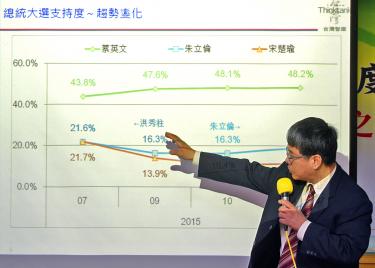A majority of Taiwanese believe the nation’s presidential candidates should make an unequivocal statement that Taiwan is not part of China, according to a Taiwan Thinktank survey released yesterday.
The telephone-based poll — carried out on Oct. 25 and Oct. 26 among people aged 20 or older — found that 64 percent of respondents think presidential candidates should clearly state that Taiwan is not part of China.
On the cross-strait relationship, 46.6 percent of those polled said that a meeting of the leaders of Taiwan and China conducted under the framework of the so-called “1992 consensus” was unacceptable, whereas 36 percent said it was acceptable.
The “1992 consensus” refers to a supposed understanding reached during cross-strait talks in 1992 that both Taiwan and China acknowledge that there is “one China,” with each side having its own interpretation of what that means.
The poll showed that 41.8 percent of respondents said Democratic Progressive Party (DPP) presidential candidate Tsai Ing-wen (蔡英文) would best safeguard Taiwan’s interests in cross-strait negotiations, while 23.8 percent backed Chinese Nationalist Party (KMT) presidential candidate Eric Chu (朱立倫) and 16.7 percent favored People First Party (PFP) challenger James Soong (宋楚瑜).
Despite Chu’s repeated warnings over the potential impact on the nation’s democratic path if the KMT loses its legislative majority, 50.3 percent of respondents said they wanted the DPP to win more than half of the 113 legislative seats to prevent the government from continuing to lean toward China.
The idea that a DPP-dominated legislature should counter the nation’s drift toward China is most prevalent among younger Taiwanese, the poll suggests, with 60.1 percent aged between 20 and 29 supporting such an approach.
With regard to the Jan. 16 presidential and legislative elections, 48.2 percent of those polled said they would vote for Tsai if the ballot were held tomorrow, while 19.4 percent said they would support Chu and 11.6 percent would opt for Soong.
Asked which of the three vice presidential candidates are best placed to assist the campaigns of their running mates, 58.1 percent of respondents said Tsai’s running mate, former Academia Sinica vice president Chen Chien-jen (陳建仁).
Ten percent opted for Chu’s running mate, former Council of Labor Affairs minister Jennifer Wang (王如玄), and 6.7 percent picked Soong’s running mate, Republic Party Chairperson Hsu Hsin-ying (徐欣瑩), the survey said.
A simple majority, 32.7 percent, said they would support district legislative candidates nominated by the DPP, while 20.4 percent said they would vote for the KMT’s candidates.
Among smaller parties, the New Power Party’s (NPP) legislative candidates received the highest support at 7.3 percent, followed by those of the PFP at 3.4 percent and the Taiwan Solidarity Union at 2.1 percent.
In terms of party votes, about 35 percent said they would vote for the DPP, while the KMT garnered 22.2 percent and the NPP 7.3 percent.
The PFP received only 5.8 percent of support — barely above the 5 percent threshold required for a party to be awarded at-large seats.
The poll collected 1,068 valid samples, with a confidence level of 95 percent and a margin of error of 3 percentage points.
Source: Taipei Times - 2015/11/30





















